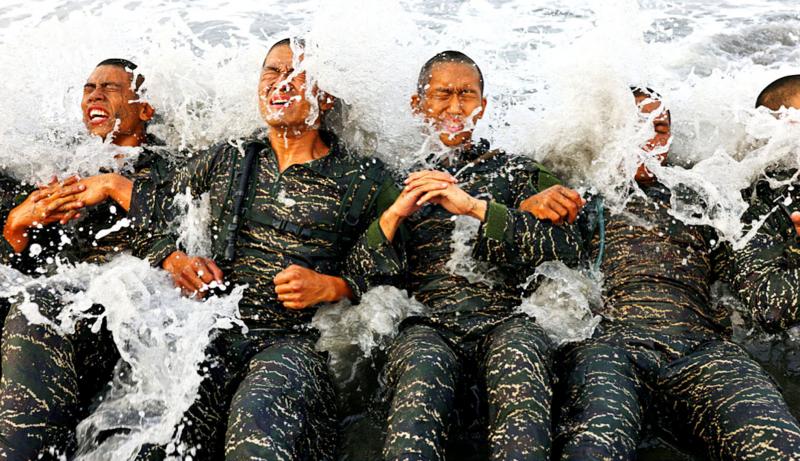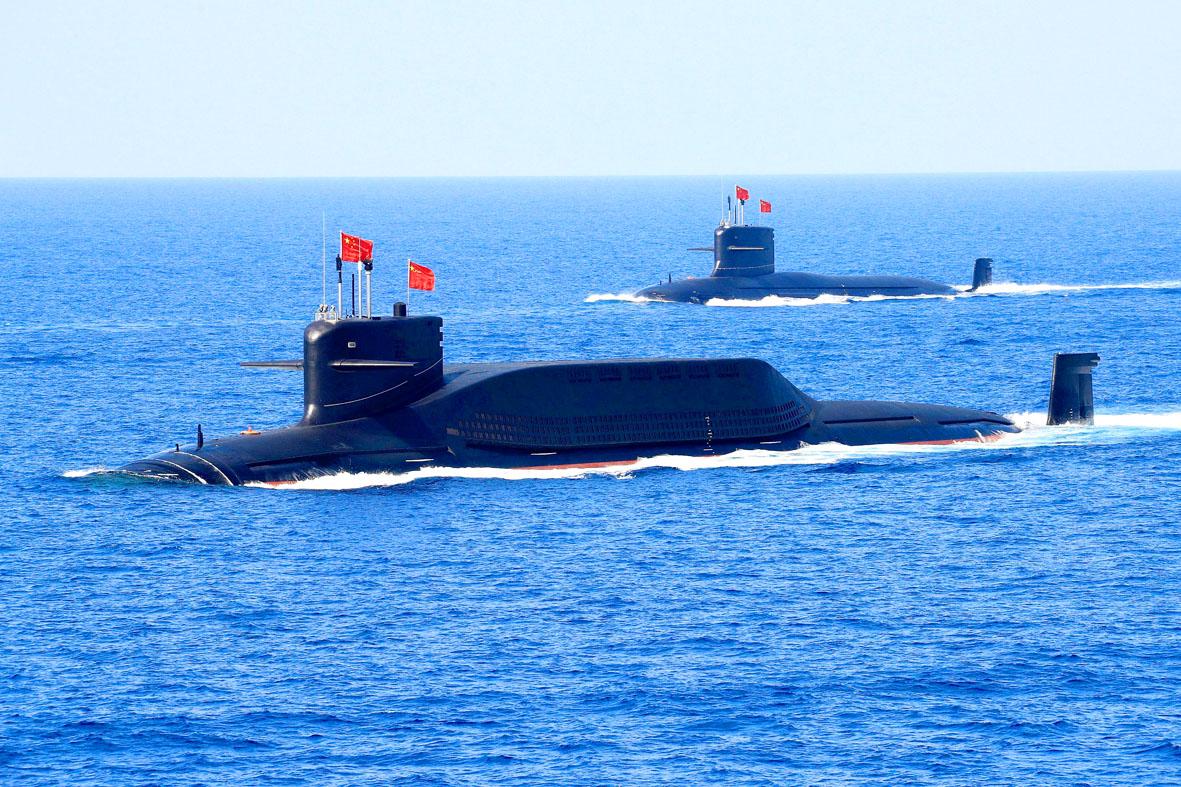As I write this on Thursday, Russia has invaded Ukraine and already numerous Taiwan pundits are rushing to reassure us that the “Taiwan is Ukraine” takes are all bad and things are quite different here, from the level of US involvement to the operational conditions of actually preparing for an invasion and tossing troops across the Taiwan Strait.
All these things are both totally true and totally unimportant. Before any war there is always a class of public speakers who are certain that things will be normal just like they have always been, because the invader is, after all, a rational actor, and anyway things are different with us (and here are all the perfectly good reasons why!).
No war repeats the conditions of a previous one, no target is the same as any other, no two would-be conquerors identical, no group of defending states a perfect echo of one long past.

Photo: REUTERS
To state that Taiwan is not Ukraine is to state a truism without important meaning. Hardly surprising that such reassuring noises are sweeping across the establishment commentariat as Russian missiles are landing on Ukrainian cities.
WAR IS COMING
We need to stop imagining that it can’t happen here and stop speaking as if life will just go on as it is right now. War is coming, as it has been since China decided to build a blue-water navy in the late 1980s.

Photo: REUTERS
Europe had decades to build capacity to prevent the Ukraine war. Their leaders talked and talked and talked …
Unlike Ukraine, whose decades were frittered away, we still have time. That means we need to stop the reassuring talk about how Taiwan is different and start more realistic talk right now: that China is coming so all the takes, hot or calm, are irrelevant. We need to not only talk about Taiwan to others in a way that summons more support to it, but we also need to be talking to Taiwan’s leaders and its people about preparing for the coming calamities.
The first thing we should be doing is calling for the development of a rigorously trained civilian response corps, with realistic drills on a regular schedule, not Monday afternoon traffic interruptions. Ukraine has been training reservists on weekends for several years.
In April of last year, the government announced that it was folding two existing agencies into a new “defense reserve mobilization agency,” whatever that means, to carry out the “all-out defense concept,” whatever that is. The government, news reports said, is planning to publish — yes! — a handbook for the public.
The Taipei Times reported that the laws creating the agency define what volunteer police and firefighters the military can mobilize, and that the defense ministry wants to expand those to include temple and church volunteers.
That’s all very nice, but the government is simply going to have to bite the bullet and create a large reserve of professionally-trained individuals who can care for the injured, dig in destroyed buildings for victims, fight fires and so forth. Ad hoc charitable volunteers are going to be quickly overwhelmed. Recall that in Typhoon Morokat, the last great disaster the island faced, the government deployed military units to rescue civilians. In a war, the civilians will have to rescue themselves.
There are many historical models, such as Great Britain’s Air Raid Warden’s Service, which was erected in 1937. During the war, it was responsible for everything from reporting fires and putting out small ones, to administering first aid and patrolling neighborhoods to ensure all the lights were out. Germany had a similar system, staffed by men over the age of conscription, to handle the effects of Allied air raids.
Real education of the public will have to begin. Buildings will have to be designated and augmented as air raid shelters — not just with cute eroding stickers on a wall somewhere tastefully hidden from sight in the usual Taiwan style, but with government monies and rigorous periodic inspections to maintain and strengthen them.
The nation should begin manufacturing and stockpiling things like helmets, body armor and kneepads, along with creating reserve hospital space for casualties. It should also start finding ways to rotate out medical personnel as volunteers in war zones elsewhere for training and experience in coping with casualties.
PROBLEM SOLVING
In an excellent set of tweets last week, longtime activist and sharp Taiwan watcher T. H. Schee, who has worked on civil defense issues, observed that Taiwan also suffers from a couple of other problems.
First, he observed that conscription has been reduced, and most young people have never spent any long period of time in the military. They are quite naive about what expectations it and society might have of them.
Second, there are no concrete plans for the million foreigners in Taiwan. Perhaps some of us from wealthy societies will have the wherewithal to scramble out. For tens of thousands of migrant workers, that will not be possible. Even as I write, some of my friends from that community are texting me about fellow migrant workers they know trapped in Ukraine.
Third, he noted that plans are mostly noise. “The idea of how ‘preparedness’ can be achieved and practiced days [before] an imminent invasion is not even brought onto the table, let alone in official execution plans,” he wrote.
Yes, Taiwan is not Ukraine, but people are saying that as if Taiwan were much better off than Ukraine. It may well be in far more vulnerable state — highly vulnerable to shock and awe attacks, with a much smaller, more concentrated geographic area, totally dependent on imports of food and energy, and thus, on access to international shipping lanes which will be cut in time of war.
Even “gray zone” tactics that threaten war could severely hurt Taiwan, as shipping insurance costs skyrocket and freight companies withdraw their services.
Civil defense preparations here could do more than just save lives. There is a whole class of pundits who make a living arguing that the US should not defend Taiwan because Taiwan isn’t serious about defending itself.
Preparations for civil defense, even more than glamor purchases of expensive hardware from the US, will help undercut that argument and strengthen the case for outside intervention, which can never have enough support.
Finally, civil defense preparations will also send a strong deterrent signal to Beijing that Taiwanese will resist and are prepared to pay the costs of that resistance.
Perhaps, if we pay the cost of civil defense, we won’t have to pay those other, more terrible costs.
Notes from Central Taiwan is a column written by long-term resident Michael Turton, who provides incisive commentary informed by three decades of living in and writing about his adoptive country. The views expressed here are his own.

Jan. 5 to Jan. 11 Of the more than 3,000km of sugar railway that once criss-crossed central and southern Taiwan, just 16.1km remain in operation today. By the time Dafydd Fell began photographing the network in earnest in 1994, it was already well past its heyday. The system had been significantly cut back, leaving behind abandoned stations, rusting rolling stock and crumbling facilities. This reduction continued during the five years of his documentation, adding urgency to his task. As passenger services had already ceased by then, Fell had to wait for the sugarcane harvest season each year, which typically ran from

It’s a good thing that 2025 is over. Yes, I fully expect we will look back on the year with nostalgia, once we have experienced this year and 2027. Traditionally at New Years much discourse is devoted to discussing what happened the previous year. Let’s have a look at what didn’t happen. Many bad things did not happen. The People’s Republic of China (PRC) did not attack Taiwan. We didn’t have a massive, destructive earthquake or drought. We didn’t have a major human pandemic. No widespread unemployment or other destructive social events. Nothing serious was done about Taiwan’s swelling birth rate catastrophe.

Words of the Year are not just interesting, they are telling. They are language and attitude barometers that measure what a country sees as important. The trending vocabulary around AI last year reveals a stark divergence in what each society notices and responds to the technological shift. For the Anglosphere it’s fatigue. For China it’s ambition. For Taiwan, it’s pragmatic vigilance. In Taiwan’s annual “representative character” vote, “recall” (罷) took the top spot with over 15,000 votes, followed closely by “scam” (詐). While “recall” speaks to the island’s partisan deadlock — a year defined by legislative recall campaigns and a public exhausted

In the 2010s, the Communist Party of China (CCP) began cracking down on Christian churches. Media reports said at the time that various versions of Protestant Christianity were likely the fastest growing religions in the People’s Republic of China (PRC). The crackdown was part of a campaign that in turn was part of a larger movement to bring religion under party control. For the Protestant churches, “the government’s aim has been to force all churches into the state-controlled organization,” according to a 2023 article in Christianity Today. That piece was centered on Wang Yi (王怡), the fiery, charismatic pastor of the